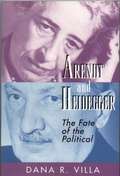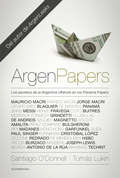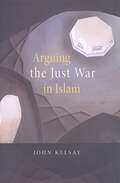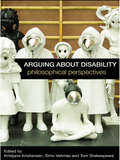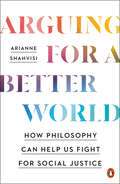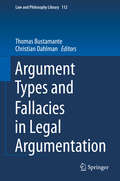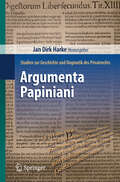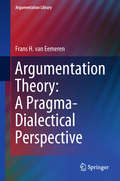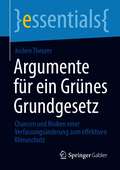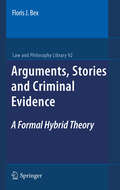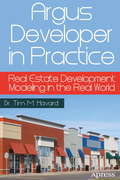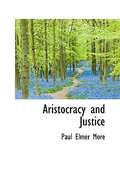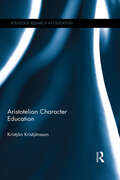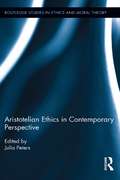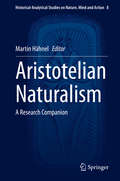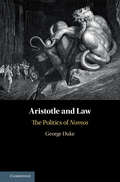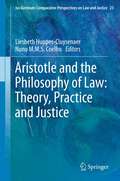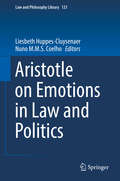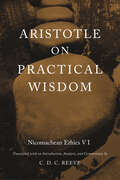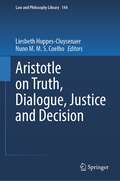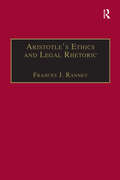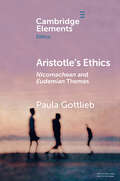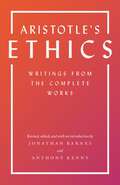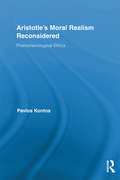- Table View
- List View
Arendt and Heidegger: The Fate of the Political
by Dana VillaTheodor Adorno once wrote an essay to "defend Bach against his devotees." In this book Dana Villa does the same for Hannah Arendt, whose sweeping reconceptualization of the nature and value of political action, he argues, has been covered over and domesticated by admirers (including critical theorists, communitarians, and participatory democrats) who had hoped to enlist her in their less radical philosophical or political projects. Against the prevailing "Aristotelian" interpretation of her work, Villa explores Arendt's modernity, and indeed her postmodernity, through the Heideggerian and Nietzschean theme of a break with tradition at the closure of metaphysics. Villa's book, however, is much more than a mere correction of misinterpretations of a major thinker's work. Rather, he makes a persuasive case for Arendt as the postmodern or postmetaphysical political theorist, the first political theorist to think through the nature of political action after Nietzsche's exposition of the death of God (i.e., the collapse of objective correlates to our ideals, ends, and purposes). After giving an account of Arendt's theory of action and Heidegger's influence on it, Villa shows how Arendt did justice to the Heideggerian and Nietzschean criticism of the metaphysical tradition while avoiding the political conclusions they drew from their critiques. The result is a wide-ranging discussion not only of Arendt and Heidegger, but of Aristotle, Kant, Nietzsche, Habermas, and the entire question of politics after metaphysics.
ArgenPapers: Los secretos de la Argentina offshore en los Panamá Papers
by Santiago O'Donnell Tomás LukinQuiénes son los políticos, los empresarios y las celebridades argentinas que tienen firmas en paraísos fiscales, y qué es lo que buscan esconder en ellos. Mossack Fonseca era uno de los creadores de sociedades offshore más importantes del planeta hasta que, a comienzos de 2016, una megafiltración expuso los secretos de una red financiera global al servicio de la fuga de capitales, la evasión impositiva, el ocultamiento y el lavado de dinero. Los primeros archivos que dieron forma a los Panamá Papers revelaron un capítulo de la disputa entre la Argentina y los fondos buitres. Los acreedores reclamaban información sobre Lázaro Báez y los Kirchner. Sin embargo, el nombre que apareció fue el de Mauricio Macri, uno de los cinco presidentes en funciones mencionados entre los once millones y medio de documentos hackeados. En esa gigantesca e intrincada base de datos, figuran también varios integrantes del PRO, futbolistas, y los dueños, accionistas y directivos de las doscientas empresas más grandes del país, así como bancos, abogados y firmas contables de prestigio. Santiago O'Donnell, elegido por el Consorcio Internacional de Periodistas de Investigación que centralizó la cobertura de dimensión global, junto con Tomás Lukin, experto en el mundo offshore, pasaron meses cruzando información de firmas que son cáscaras vacías y directivos con nombres de paja. De esa compleja indagación surgió este libro fascinante que revela cómo se maneja el poder real y quiénes son los verdaderos dueños de la Argentina. Mauricio Macri, Franco Macri, Jorge Macri, Lázaro Báez, Blaquier, De Narváez, Panamá, Jinkis, Messi, Heinze, Frávega, Coto, Buitres, Mossack Fonseca, Grindetti, Clusellas, De Andreis, Saguier, Magnetto, Soldati, Amalita, Pérez Companc, Bulgheroni, FIFA, Madanes, Hong Kong, Garfunkel, Suiza, Paul Singer, Eurnekian, Cristóbal López, Ciccone, Redrado, De Mendiguren, HSBC, Arcor, Burzaco, Massera, Joseph Lewis, Nevada, Antonio De La Rúa, Bahamas, Techint.
Arguing The Just War In Islam
by John Kelsay<P>Jihad, with its many terrifying associations, is a term widely used today, though its meaning is poorly grasped. Few people understand the circumstances requiring a jihad, or "holy" war, or how Islamic militants justify their violent actions within the framework of the religious tradition of Islam. <P>How Islam, with more than one billion followers, interprets jihad and establishes its precepts has become a critical issue for both the Muslim and the non-Muslim world.<P> John Kelsay's timely and important work focuses on jihad of the sword in Islamic thought, history, and culture.<P> Making use of original sources, Kelsay delves into the tradition of shari'a--Islamic jurisprudence and reasoning--and shows how it defines jihad as the Islamic analogue of the Western "just" war. <P>He traces the arguments of thinkers over the centuries who have debated the legitimacy of war through appeals to shari'a reasoning. <P>He brings us up to the present and demonstrates how contemporary Muslims across the political spectrum continue this quest for a realistic ethics of war within the Islamic tradition.<P> Arguing the Just War in Islam provides a systematic account of how Islam's central texts interpret jihad, guiding us through the historical precedents and Quranic sources upon which today's claims to doctrinal truth and legitimate authority are made.<P>In illuminating the broad spectrum of Islam's moral considerations of the just war, Kelsay helps Muslims and non-Muslims alike make sense of the possibilities for future war and peace.
Arguing about Disability: Philosophical Perspectives
by Tom Shakespeare Kristjana Kristiansen Simo VehmasDisability is a thorny and muddled concept - especially in the field of disability studies - and social accounts contest with more traditional biologically based approaches in highly politicized debates. Sustained theoretical scrutiny has sometimes been lost amongst the controversy and philosophical issues have often been overlooked in favour of the sociological. Arguing about Disability fills that gap by offering analysis and debate concerning the moral nature of institutions, policy and practice, and their significance for disabled people and society. This pioneering collection is divided into three sections covering definitions and theories of disability; disabled people in society and applied ethics. Each contributor – drawn from a wide range of academic backgrounds including disability studies, sociology, psychology, education, philosophy, law and health science – uses a philosophical framework to explore a central issue in disability studies. The issues discussed include personhood, disability as a phenomenon, social justice, discrimination and inclusion. Providing an overview of the intersection of disability studies and philosophical ethics, Arguing about Disability is a truly interdisciplinary undertaking. It will be invaluable for all academics and students with an interest in disability studies or applied ethics, as well as disability activists.
Arguing for a Better World: How Philosophy Can Help Us Fight for Social Justice
by Arianne ShahvisiIs it sexist to say that &“men are trash&”? Can white people be victims of racism? Do we bear any individual responsibility for climate change?We&’ve all wrestled with questions like these, whether we&’re shouting at a relative across the dinner table, quarreling with old classmates on social media, or chatting late into the night with friends. Many people give kneejerk answers that roughly align with their broader belief system, but flounder when asked for their reasoning, leading to a conversational stalemate—especially when faced with a political, generational, or cultural divide.The truth is that our answers to these questions almost always rely on unexamined assumptions. In Arguing for a Better World, philosopher Arianne Shahvisi shows us how to work through thorny moral questions by examining their parts in broad daylight, equipping us to not only identify our own positions but to defend them as well. This book demonstrates the relevance of philosophy to our everyday lives, and offers some clear-eyed tools to those who want to learn how to better fight for justice and liberation for all.
Argument Types and Fallacies in Legal Argumentation (Law and Philosophy Library #112)
by Christian Dahlman Thomas BustamanteThis book provides theoretical tools for evaluating the soundness of arguments in the context of legal argumentation. It deals with a number of general argument types and their particular use in legal argumentation. It provides detailed analyses of argument from authority, argument ad hominem, argument from ignorance, slippery slope argument and other general argument types. Each of these argument types can be used to construct arguments that are sound as well as arguments that are unsound. To evaluate an argument correctly one must be able to distinguish the sound instances of a certain argument type from its unsound instances. This book promotes the development of theoretical tools for this task.
Argumenta Papiniani: Studien zur Geschichte und Dogmatik des Privatrechts
by Jan Dirk HarkeDer besondere Einfluss der Rhetorik, den das Werk des spätklassischen Juristen Papinian kennzeichnet, hat auch das Urteil späterer Juristen über seine wissenschaftliche Leistung geprägt und gleichermaßen Anerkennung und Ablehnung provoziert. Seine Methode der Rechtsfindung zu erkunden war das Ziel einer Tagung im Kloster Bronnbach. Die hierzu geleisteten Beiträge gelten der Regelbildung und den Absurditätsargumenten bei Papinian, seiner Argumentation in Pfandrechtsfragen und bei der Testamentsauslegung, seiner Haltung zu Freilassungs- und Prositutionsverboten bei Sklavenverkäufen und der Herausbildung einer Vorform des Anwartschaftsrechts zum Schutz bedingt freigelassener Sklaven sowie schließlich seinem Werk über den Ehebruch.
Argumentation Theory: A Pragma-Dialectical Perspective (Argumentation Library #33)
by Frans H. van EemerenThe book offers a compact but comprehensive introductory overview of the crucial components of argumentation theory. In presenting this overview, argumentation is consistently approached from a pragma-dialectical perspective by viewing it pragmatically as a goal-directed communicative activity and dialectically as part of a regulated critical exchange aimed at resolving a difference of opinion. As a result, the book also systematically explains how the constitutive parts of the pragma-dialectical theory of argumentation, which are discussed in a number of separate publications, hang together.The following crucial topics are discussed: (1) argumentation theory as a discipline; (2) the meta-theoretical principles of pragma-dialectics; (3) the model of a critical discussion aimed at resolving a difference of opinion; (4) fallacies as violations of a code of conduct for reasonable argumentative discourse; (5) descriptive research of argumentative reality; (6) analysis as theoretically-motivated reconstruction; (7) strategic manoeuvring aimed at combining achieving effectiveness with maintaining reasonableness; (8) the conventionalization of argumentative practices; (9) prototypical argumentative patterns; (10) pragma-dialectics amidst other approaches.Argumentation Theory: A Pragma-Dialectical Perspective is clearly written and makes argumentation theory understandable to all scholars and advanced students interested in argumentation research.
Argumente für ein Grünes Grundgesetz: Chancen und Risiken einer Verfassungsänderung zum effektiven Klimaschutz (essentials)
by Jochen TheurerDie Erderwärmung schreitet stetig voran. Dennoch setzen die regierenden Politiker die längst erforderlichen Maßnahmen nicht konsequent um. Daran haben auch millionenfache Proteste aus der Mitte der Gesellschaft nichts geändert. Doch ist die Zivilgesellschaft wirklich machtlos? Jochen Theurer erforscht in diesem essential eine interessante neue Handlungsoption für die schnelle Einführung effektiver Klimaschutzmaßnahmen. Charmant, informativ und realistisch.
Arguments, Stories and Criminal Evidence: A Formal Hybrid Theory (Law and Philosophy Library #92)
by Floris J. BexIn this book a theory of reasoning with evidence in the context of criminal cases is developed. The main subject of this study is not the law of evidence but rather the rational process of proof, which involves constructing, testing and justifying scenarios about what happened using evidence and commonsense knowledge. A central theme in the book is the analysis of ones reasoning, so that complex patterns are made more explicit and clear. This analysis uses stories about what happened and arguments to anchor these stories in evidence. Thus the argumentative and the narrative approaches from the research in legal philosophy and legal psychology are combined. Because the book describes its subjects in both an informal and a formal style, it is relevant for scholars in legal philosophy, AI, logic and argumentation theory. The book can also appeal to practitioners in the investigative and legal professions, who are interested in the ways in which they can and should reason with evidence.
Argus Developer in Practice: Real Estate Development Modeling in the Real World
by Tim M. HavardThis book is a practical guide to using ArgusDeveloper, the worldOCOs most widely used real estate development feasibilitymodeling software. Using practical examples and many case studies, it takesreaders beyond basic training and provides the in-depth knowledge required toanalyze potential real estate deals and help ensure a profitable development. Argus Developer in Practice fillsan important gap in the market. Argus Developer, and its predecessor CircleDeveloper, has long had a dominant position as the primary real estatedevelopment appraisal tool. It is used all over the world on a variety ofprojects ranging from simple residential projects to huge and complex masterplanned, mixed-use, commercial, residential, and leisure projects. It also shineswhen used to appraise OC refurbsOCOOCotaking an existing building or complex andupgrading it or turning it into something entirely different. Argus Developer in Practice, thefirst book that concentrates on the practical application and use of the program, goes beyond the manual that comes with it by taking you through thedevelopment/project appraisal process step by step. In addition, author TimHavard has over 25 years of experience in carrying out development appraisalsboth in practice and in teaching at the postgraduate level in UK and Australianuniversities. He started using the DOS version of Circle Developer in 1990, then worked for both Circle and Argus training clients on the software in theUK, continental Europe, and the Middle East. Besides showing you how to use theprogram, Havard shows you how to think like a successful real estate developer. Using an extensive array of screenshots, ArgusDeveloper in Practice delves deeply into practical use of theprogram by offering case studies of varying complexity that will help realestate professionals not just analyze development projects but also learn howthe best minds in real estate analyze a projectOCOs potential. You will learn: How to model both simple projects and complex mixed-use and multi-phased investment schemes How to model new uses for existing properties How to think through real estate project problems How to analyze a potential development project in depth By using the program efficiently and making use of itsmore advanced features, you can help ensure a profitable project without thesurprises that accompany most real estate ventures. Argus Developer in Practice therefore providessomething pricelessOCopeace of mind. "
Aristocracy and Justice
by Paul Elmer MoreThis is a pre-1923 historical reproduction that was curated for quality. Quality assurance was conducted on each of these books in an attempt to remove books with imperfections introduced by the digitization process.
Aristotelian Character Education (Routledge Research in Education)
by Kristján KristjánssonThis book provides a reconstruction of Aristotelian character education, shedding new light on what moral character really is, and how it can be highlighted, measured, nurtured and taught in current schooling. Arguing that many recent approaches to character education understand character in exclusively amoral, instrumentalist terms, Kristjánsson proposes a coherent, plausible and up-to-date concept, retaining the overall structure of Aristotelian character education.After discussing and debunking popular myths about Aristotelian character education, subsequent chapters focus on the practical ramifications and methodologies of character education. These include measuring virtue and morality, asking whether Aristotelian character education can salvage the effects of bad upbringing, and considering implications for teacher training and classroom practice. The book rejuvenates time-honoured principles of the development of virtues in young people, at a time when ‘character’ features prominently in educational agendas and parental concerns over school education systems.Offering an interdisciplinary perspective which draws from the disciplines of education, psychology, philosophy and sociology, this book will appeal to researchers, academics and students wanting a greater insight into character education.
Aristotelian Ethics in Contemporary Perspective (Routledge Studies in Ethics and Moral Theory)
by Julia PetersBy bringing together influential critics of neo-Aristotelian virtue ethics and some of the strongest defenders of an Aristotelian approach, this collection provides a fresh assessment of the strengths and weaknesses of Aristotelian virtue ethics and its contemporary interpretations. Contributors critically discuss and re-assess the neo-Aristotelian paradigm which has been predominant in the philosophical discourse on virtue for the past 30 years.
Aristotelian Naturalism: A Research Companion (Historical-Analytical Studies on Nature, Mind and Action #8)
by Martin HähnelThis book features many of the leading voices championing the revival of Neo-Aristotelian Ethical Naturalism (AN) in contemporary philosophy. It addresses the whole range of issues facing this research program at present. Coverage in the collection identifies differentiations, details standpoints, and points out new perspectives. This volume answers a need: AN is quite new to contemporary philosophy, despite its deep roots in the history of philosophy. As yet, there are many unanswered questions regarding its relation to contemporary views in metaethics. It is certainly not equivalent to dominant naturalistic approaches to metaethics in Anglophone philosophy. Indeed, it is not obviously incompatible with some approaches identified as nonnaturalistic. Further, there are controversies regarding the views of the first wave of virtue revivalists. The work of G.E.M. Anscombe and Philippa Foot is frequently misunderstood, despite the fact that they are important figures in the contemporary revival. This volume details a robust approach to ethics by situating it within the context of human life. It will help readers to better understand how AN raises deep questions about the relation of action and its evaluation to human nature. Neo-Aristotelians argue that something like the traditional cardinal virtues, practical wisdom, temperance, justice and courage, are qualities that perfect human reason and desire.
Aristotle
by Brad Inwood Raphael WoolfAristotle's Eudemian Ethics has been unjustly neglected in comparison with its more famous counterpart the Nicomachean Ethics. This is in large part due to the fact that until recently no complete translation of the work has been available. But the Eudemian Ethics is a masterpiece in its own right, offering valuable insights into Aristotle's ideas on virtue, happiness and the good life. This volume offers a translation by Brad Inwood and Raphael Woolf that is both fluent and exact, and an introduction in which they help the reader to gain a deeper understanding both of the Eudemian Ethics and of its relation to the Nicomachean Ethics and to Aristotle's ethical thought as a whole. The explanatory notes address Aristotle's many references to other works, people and events. The volume will be of interest to students and scholars of the history of ethics, ancient and moral philosophy, and Aristotle studies.
Aristotle and Law: The Politics of Nomos
by George DukeIn Aristotle and Law, George Duke argues that Aristotle's seemingly dispersed statements on law and legislation are unified by a commitment to law's status as an achievement of practical reason. This book provides a systematic exposition of the significance and coherence of Aristotle's account of law, and also indicates the relevance of this account to contemporary legal theory. It will be of great interest to scholars and students in jurisprudence, philosophy, political science and classics.
Aristotle and The Philosophy of Law: Theory, Practice And Justice (Ius Gentium: Comparative Perspectives on Law and Justice #23)
by Nuno M.M.S. Coelho Liesbeth Huppes-CluysenaerThe book presents a new focus on the legal philosophical texts of Aristotle, which offers a much richer frame for the understanding of practical thought, legal reasoning and political experience. It allows understanding how human beings interact in a complex world, and how extensive the complexity is which results from humans' own power of self-construction and autonomy. The Aristotelian approach recognizes the limits of rationality and the inevitable and constitutive contingency in Law. All this offers a helpful instrument to understand the changes globalisation imposes to legal experience today. The contributions in this collection do not merely pay attention to private virtues, but focus primarily on public virtues. They deal with the fact that law is dependent on political power and that a person can never be sure about the facts of a case or about the right way to act. They explore the assumption that a detailed knowledge of Aristotle's epistemology is necessary, because of the direct connection between Enlightened reasoning and legal positivism. They pay attention to the concept of proportionality, which can be seen as a precondition to discuss liberalism.
Aristotle on Emotions in Law and Politics (Law and Philosophy Library #121)
by Nuno M.M.S. Coelho Liesbeth Huppes-CluysenaerIn this book, experts from the fields of law and philosophy explore the works of Aristotle to illuminate the much-debated and fascinating relationship between emotions and justice.<P><P> Emotions matter in connection with democracy and equity – they are relevant to the judicial enforcement of rights, legal argumentation, and decision-making processes in legislative bodies and courts. The decisive role that emotions, feelings and passions play in these processes cannot be ignored – not even by those who believe that emotions have no legitimate place in the public sphere. A growing body of literature on these topics recognizes the seminal insights contributed by Aristotle. This book offers a comprehensive analysis of his thinking in this context, as well as proposals for inspiring dialogues between his works and those written by a selection of modern and contemporary thinkers. As such, the book offers a valuable resource for students of law, philosophy, rhetoric, politics, ethics and history, but also for readers interested in the ongoing debate about legal positivism and the relevance of emotions for legal and political life in today’s world. <P> Explains how Aristotle’s attention to the non-rational elements of cognition contributes to his realistic views on the rule of law, social cohesion, democracy and judgment.<P> Re-appraises Aristotle’s biological view on the continuity between human and animal life.<P> Shows the striking similarity between the views of contemporary neuro-scientists and Aristotle’s thoughts on emotion.<P> Examines many of Aristotle’s writings such as Nicomachean Ethics, Politics, Rhetoric and Metaphysics.<P> Presents the outcomes of several years of interdisciplinary collaboration between ancient philosophy scholars, legal theorists, political scientists and historians
Aristotle on Practical Wisdom: <i>Nicomachean Ethics</i> VI
by C. D. ReeveNicomachean Ethics VI is considered one of classical philosophy’s greatest achievements. Aristotle on Practical Wisdom is the first full-scale commentary on this work to be issued in over a century, and is the most comprehensive and philosophically illuminating to date. A meticulous translation coupled with facing-page analysis enables readers to engage directly with the account of phronêsis or practical wisdom that Aristotle is developing, while a full introduction locates that account in the context of his ethical thought and of later ethical thought more generally. The commentary discusses the text line by line, illuminating obscure passages, explaining technical ones, and providing a new overall interpretation of the work and the nature of practical reason.A companion volume, Action, Contemplation, and Happiness, expands on this interpretation to provide a startling new picture of Aristotle’s thought as a whole. Although the two books can be approached separately, together they constitute one of the most daring and original contemporary readings of Aristotle’s philosophy. Aimed at committed students of these notoriously difficult writings, C. D. C. Reeve’s engaging and lucid books should find a wide audience among philosophers, classicists, and all readers willing to wrestle with a thinker of unparalleled subtlety, depth, and scope.
Aristotle on Truth, Dialogue, Justice and Decision (Law and Philosophy Library #144)
by Liesbeth Huppes-Cluysenaer Nuno M. M. S. CoelhoIn this thought-provoking book, you’ll find timeless questions explored through a fresh lens. First delving into the profound significance of Socrates’ dialogical method and the inescapable nature of conflict, it ponders the rational capacities of humanity in terms of establishing harmonious communities. But this isn’t merely a philosophical debate; it’s a pragmatic exploration of real-world challenges.No longer limiting itself to abstract theories, the book then seeks to navigate the practical terrain of science and politics. Drawing inspiration from Aristotle, renowned for his investigations into the intricate connections between theory, technology, ethics, and politics, it tackles the essential question: How can we reconcile divergent views?At the book’s core lies Aristotle’s revolutionary concept of dialogue, which portrays truth as a delicate equilibrium between opposing forces, transcending the rigid boundaries of true and false. Join this captivating journey as the author reveals the hidden paths to meaningful coexistence in a world filled with conflicting perspectives.
Aristotle's Ethics and Legal Rhetoric: An Analysis of Language Beliefs and the Law (Law, Justice And Power Ser.)
by FrancesJ. RanneyTaking the novel position of dealing with law, classical rhetoric and feminism concurrently, this book considers the effects of beliefs about language on those who attempt to theorize about and use law to accomplish practical and political purposes. The author employs Aristotle's terminology to analyze economic and literary schools of thought in the US legal academy, noting the implicit language theory underlying claims by major thinkers in each school about the nature of law and its relationship to justice. The underlying assumption is that, as law can only work through language, beliefs about its relationship to justice are determined by assumptions about the nature of language. In addition, the author provides an alternative, feminist rhetoric that, being focused on the production of texts rather than their interpretation, offers a practical ethic of intervention.
Aristotle's Ethics: Nicomachean and Eudemian Themes (Elements in Ethics)
by Paula GottliebThis Element is an examination of the philosophical themes presented in Aristotle's Nicomachean and Eudemian Ethics. Topics include happiness, the voluntary and choice, the doctrine of the mean, particular virtues of character and temperamental means, virtues of thought, akrasia, pleasure, friendship, and luck. Special attention has been paid to Aristotle's treatment of virtues of character and thought and their relation to happiness, the reason why Aristotle is the quintessential virtue ethicist. The virtues of character have not received the attention they deserve in most discussions of the relationship between the two treatises.
Aristotle's Ethics: Writings from the Complete Works - Revised Edition
by AristotleAristotle's moral philosophy is a pillar of Western ethical thought. It bequeathed to the world an emphasis on virtues and vices, happiness as well-being or a life well lived, and rationally motivated action as a mean between extremes. Its influence was felt well beyond antiquity into the Middle Ages, particularly through the writings of St. Thomas Aquinas. In the past century, with the rise of virtue theory in moral philosophy, Aristotle’s ethics has been revived as a source of insight and interest. While most attention has traditionally focused on Aristotle’s famous Nicomachean Ethics, there are several other works written by or attributed to Aristotle that illuminate his ethics: the Eudemian Ethics, the Magna Moralia, and Virtues and Vices.This book brings together all four of these important texts, in thoroughly revised versions of the translations found in the authoritative complete works universally recognized as the standard English edition. Edited and introduced by two of the world’s leading scholars of ancient philosophy, this is an essential volume for anyone interested in the ethical thought of one of the most important philosophers in the Western tradition.
Aristotle's Moral Realism Reconsidered: Phenomenological Ethics (Routledge Studies in Ethics and Moral Theory)
by Pavlos KontosThis book elaborates a moral realism of phenomenological inspiration by introducing the idea that moral experience, primordially, constitutes a perceptual grasp of actions and of their solid traces in the world. The main thesis is that, before any reference to values or to criteria about good and evil—that is, before any reference to specific ethical outlooks—one should explain the very materiality of what necessarily constitutes the ‘moral world’. These claims are substantiated by means of a text- centered interpretation of Aristotle’s Nicomachean Ethics in dialogue with contemporary moral realism. The book concludes with a critique of Heidegger’s, Gadamer’s and Arendt’s approaches to Aristotle’s ethics.
